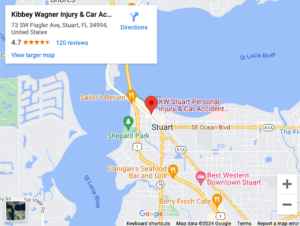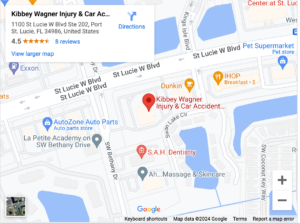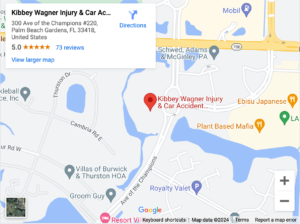
Liability is an important term in a personal injury lawsuit. Liability in the context of a personal injury case refers to a legally enforceable claim against someone. When a party to a personal injury case is liable for the victim’s injury, they typically must pay compensation, also called damages, to the victim.
In this article, we examine the concept of liability in a personal injury lawsuit.
The Relationship Between Negligence and Liability

The majority of personal injury lawsuits in Florida are based on negligence claims. In other words, in the majority of personal injury cases, the plaintiff in the case must demonstrate that the defendant’s negligence resulted in their injuries.
When a plaintiff is successful in proving that the defendant was negligent, the court will find the defendant liable for the plaintiff’s injuries.
To succeed in a personal injury lawsuit based on negligence, a plaintiff must prove the following four elements:
- The plaintiff was owed a duty of care by the defendant
- The defendant breached this duty
- The defendant’s breach caused the plaintiff’s injuries
- The plaintiff suffered damages as a result of the breach
The plaintiff must prove these elements by a preponderance of the evidence, meaning they’re more likely true than not (i.e., more than 50% true).
Proving Liability in a Florida Personal Injury Case
In a personal injury lawsuit in the state of Florida, the court examines evidence presented by the parties to determine whether the defendant’s negligence caused the plaintiff’s injuries. Negligence is one party’s failure to act as a reasonable person would in a similar situation.
Therefore, in a personal injury case involving allegations of negligence, the court must determine whether the defendant’s behavior was reasonable under the circumstances.
Given that the reasonableness of the defendant’s behavior is a major factor in a personal injury case, one of the first things an injured party’s attorney must do is argue to the court that a reasonable person would have acted differently than the defendant in the same situation.
Next, the plaintiff’s lawyer must provide evidence that the defendant’s unreasonableness caused the plaintiff’s injuries.
If the plaintiff in a personal injury case is successful, the court will make a determination regarding the amount of compensation the defendant must provide to the plaintiff.
However, most personal injury lawsuits in Florida never go to trial. Instead, most cases involving personal injuries are settled before they are tried before a judge and jury. And this applies even if a plaintiff’s lawyer files a personal injury lawsuit.
Strict Liability in a Personal Injury Case
Although the majority of personal injury cases in Florida involve allegations of negligence, some cases don’t require a showing of negligence.
For example, cases involving strict liability don’t require the plaintiff to prove that the defendant was negligent. Instead, in a strict liability case, all the plaintiff is required to prove is that the defendant caused their injuries.
Most strict liability cases in Florida involve defective products. In a product liability lawsuit, if the plaintiff can demonstrate that a product’s defective nature caused their injuries, they are eligible to obtain damages without first proving negligence.
The Relationship Between Damages and Liability
When a plaintiff’s personal injury lawsuit is successful, the defendant may be ordered to pay damages to the plaintiff.
There are several types of damages available in Florida personal injury lawsuits, including:
- Medical expenses
- Loss of enjoyment of life
- Lowered quality of life
- Pain and suffering
- Property damage
- Lost income and benefits
- Health care expenses
- Personal care expenses
- Lowered earning potential
- Emotional distress
- Mental anguish
The value of these damages will depend on many factors, including the severity of the plaintiff’s injuries, the strength of the evidence, and the parties involved.
The Statute of Limitations for Personal Injury Lawsuits in Florida
In Florida, an injured person must typically file a personal injury lawsuit within two years from the date of their injury. However, some types of personal injury cases have different filing deadlines.
If you’ve been hurt in an accident in Florida, you must act quickly to ensure that you meet the applicable deadline. If you fail to do so, you will be barred from obtaining compensation for your injuries.
Contact a Stuart Personal Injury Lawyer for Help Establishing Liability
If you’ve suffered an injury in Stuart, Florida, you need the help of a knowledgeable personal injury lawyer from Kibbey Wagner Injury & Car Accident Lawyers. An attorney will collect evidence proving liability in your case and ensure you’re treated fairly throughout the claims process. Contact us today for a free consultation by calling (772) 444-7000.




